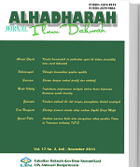RETRACTED ARTICLE: Effectiveness of Social Media Platforms in Disseminating Qur'anic Teachings among Contemporary Muslims
DOI:
https://doi.org/10.18592/alhadharah.v22i2.9164Keywords:
contemporary, effectiveness, Muslims, Qur’an, social media, teachingsAbstract
Retraction Notice This article has been retracted from Alhadharah: Jurnal Ilmu Dakwah because the authors submitted the same work to multiple journals, resulting in duplicate publication. The article was first published in Spektra: Jurnal Ilmu-ilmu Sosial, Vol. 5 No. 1 (2023), pp. 47-64, on 22 September 2023, with the same title: "EFFECTIVENESS OF SOCIAL MEDIA PLATFORMS IN DISSEMINATING QUR’ANIC TEACHINGS AMONG CONTEMPORARY MUSLIMS". Authors are explicitly informed before submission that the manuscript must not have been previously published or be under consideration for publication elsewhere. Submitting the same research to more than one journal without appropriate acknowledgment constitutes a breach of publication ethics. The article has been retracted in accordance with the Committee on Publication Ethics (COPE) guidelines, following a recommendation by the editors after consultation with other members of the editorial team. We apologise to the readers, reviewers, and editorial boards of both journals for this breach of ethical standards. The editorial team of Alhadharah: Jurnal Ilmu Dakwah will take necessary measures to prevent similar incidents in the future.References
Abidin, J., & Fahmi, I. (2019). Social Media Influencing Students’ Religious Behavior and its Solutions Through Islamic Religious Education. Jurnal Wahana Karay Ilmiah, 3(1), 305-312.
Al-Hilali, M.T., and Khan, M.M., (2002). Translation of the Meanings of the Noble Qur’an in the English Language. Madinah, K.S.A: King Fard Complex for the Printing of the Holy Qur’an.
Altenhofen, B., (2022). Authority: Maintaining and Establishing Authority on Facebook. In Digital Religion: Understanding Religious Practice in Digital Media. Edited by Heidi A. Campbell and Ruth Tsuria. London: Routledge, pp. 205–12.
Bandura, A. (1986). Social Foundations of Thought and Action. Englewood Cliffs, NJ. Np.
Budyastomo A.W., (2020). The Influence of Social Media for the Development of Da’wah and Nahdlatul Ulama Society Behavior. JNUS: Journal of Nahdlatul Ulama Studies Vol. 1, No. 1, pp. 106-130.
Cheong, P., (2011). Religion and Social Media: Got Web? Communication and Mass Media Complete, Ipswich. Vol. 58 (1), p. 23.
Evolvi, G., (2019). Blogging My Religion: Secular, Muslim, and Catholic Media Spaces in Europe. Abingdon: Routledge.
Faraz R., (2022). The Fiqh of Social Media: Seekers Guidance Critical Issues Seminar. Retrieved from https://seekersguidance.org/articles/general-artices/the-fiqh-of-social-media-seekersguidance-critical-issues-seminar/
Hasan, H., (2019). Contemporary Religious Movement in Indonesia; A Study of Hijrah Festival in Jakarta in 2018. Journal of Indonesian Islam 13 (1): 15–30. https://doi.org/10.15642/JIIS.2019.13.1.230-265.
Jusoh N.H., & Kamaruzaman J., (2009). Using Multimedia in Teaching Islamic Studies. Journal Media and Communication Studies, Vol. 1(5), pp. 086-094.
Jafar, I. (2017). The Concept of News in Al-Qur’an Implications in the System of Reporting on Social Media. Jurnal Jurnalisa, 3(1), 1-15.
Kamsin, A. et al., (2015). Program for Developing the Novel Qur’an and Hadith Authentication System. International Journal of Islam and Applied Computer. Sci. Technology, Vol. 3, No. 1, pp. 8–17.
Khan M.M., (1996). The Translation of the Meaning of Sahih Al-Bukhari, Arabic-English. Riyadh, Saudi Arabia: Darrussalam.
Mallam Yusuf Olaolu Ali, (2015). Repositioning MSSN to face Modern Challenges in Islamic Propagation Being a Lecture Delivered at the MSSN Stakeholders Conference National Mosque, Abuja. On 14th Rajab, 1436 A.H.
Makinuddin, M. (2021). An Analysis of Al-Qur’an Language as a Mediator for Politicization of Religion in Indonesia. Jurnal Studi Ilmu-Ilmu Al-Qur’an Dan Hadis, 22(2), 371-386.
Mohammad, H, and Ansusa D.I., (2019). The Role of Technology and Social Media in Spreading the Qur’an and Hadith by Mubalig. DINIKA Academic Journal of Islamic Studies Vol. 4, No. 1, pp. 45-64.
Mufti Ismail Menk, (2020). Glorious Qur’an on Social Media. An Audio Lecture.
Nasiruddin al-Khattab, (2007). English Translation of Sunan Ibn Majah of Imam Muhammad Bin Yazeed Ibn Majah Al-Qizwini. Riyadh: Dar-us-Salam.
Pitchan, M. A., Nur, S., Abd, H., Mohd, R. &, Ariff, I., & Kashim, M. (2018). Al-Daruriyyat Theory and the Use of Social Media: A Conceptual Discussion. Jurnal Komunikasi: Malaysian Journal of Communication, 34(4), 75-92.
Qayyum, A. and Mahmood, Z. (2015). Role of Social Media in the Light of Islamic Teaching. Al Qalam, (December), pp. 29.
Robert, G., (2013). The use of Social Media for Constructive Discussion in an Academic Events Management Unit: An Australian Practice-Based Case Study, European Journal of Academic Research, Vol. 1, Issue 1. pp. 4 – 5.
Rozehnal, R., ed. (2022). Cyber Muslims Mapping Islamic Digital Media in the Internet Age. London: Bloomsbury.
Salman, J., (2016). “Impact of Media and Social Media on Islam and Muslims”. Retrieved from islamicstudies.islammessage.com/ResearchPapers.aspx. Retrieved on 23/02/2016.
Setyawan, H.A., (2017). Information Fiqh in the Age of Social Media in Building Ethical Communication (Study of Fiqh Information Studies Perspectives of Muhammadiyah Organizations), delivered at the National Seminar on "Building Social Political Ethics Towards a Just Society", which was held by FISIP, University of Lampung on December 18, at the Swiss Bell Hotel, Bandar Lampung.
Sisler, V., (2007). The Internet and the Construction of Islamic Knowledge in Europe, Masaryk University Journal of Law and Technology 2, no. 2 (2007): 214.
Sulayman Y., (2018). Religion as Media in the Age of Modern Technology. Jurnal Ilmu Agama: 18(2), 83-91. https://doi.org/10.19109/jia.v18i2.2368
Sultan, S., (2011). The Koran for Dummies. John Wiley & Sons.
Whitehead, A. N., (1959). The aims of education. Daedalus, Vol. 88, No. 1, pp. 192–205.
Widdowson, H. G., (1998). Context, Community, and Authentic Language. TESOL Q., Vol. 32, No. 4, pp. 705–716.
Published
How to Cite
Issue
Section
License
Copyright (c) 2023 Muhammad Maga Sule

This work is licensed under a Creative Commons Attribution-NonCommercial 4.0 International License.
Authors retain copyright and grant the journal the right of first publication, with the work simultaneously licensed under the Creative Commons Attribution-NonCommercial 4.0 International Public License (CC BY-NC 4.0). This license allows reusers to distribute, remix, adapt, and build upon the material in any medium or format for noncommercial purposes only, provided that proper attribution is given to the original creator.







